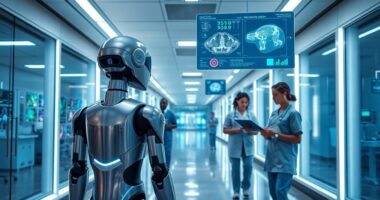As AI quietly takes on more tasks in the workplace, it's natural to feel uneasy about your job's future. Automation might streamline processes, but it could also lead to unexpected changes in roles and responsibilities. Instead of fearing these advancements, consider how they might reshape your daily work life. Are you prepared to adapt and thrive in an AI-enhanced environment? The answer could define your career trajectory in the years to come.

Are you worried about AI taking over your job? You're not alone. With 98% of business executives considering AI essential, it's clear that workplaces are rapidly transforming. Yet, there's a growing concern among employees; 44% of companies using AI foresee layoffs by 2024. For many, the introduction of AI tools like ChatGPT has already led to significant changes, with 48% of firms reporting that AI has replaced workers. The reality is stark: about 60% of jobs in advanced economies face the risk of automation.
However, while the fear of job displacement is valid, it's essential to look at the bigger picture. By 2030, it's estimated that 14% of the global workforce may need to switch careers due to AI advancements. Yet, there's a silver lining. For every job that might be lost, 69 million new roles are anticipated to emerge as technology evolves. You might find yourself in a situation where upskilling is crucial, as 83% of companies believe that showcasing AI skills could help employees retain their positions. 44% of companies using AI expect layoffs in 2024 adds to the urgency for workers to adapt.
Many office tasks, especially administrative ones, are at high risk of automation. Nearly half of these tasks could be handled by AI, potentially eliminating over 7.5 million data entry jobs by 2027. But rather than viewing AI as a direct threat, consider it as a tool to enhance your productivity. AI can assist you in writing content, setting up ads, and simplifying various work processes. The key is to adapt and learn how to work alongside AI.
The future of work will undoubtedly shift. By 2030, activities that account for up to 30% of hours worked in the U.S. could be automated. This means that occupational shifts are on the horizon, with about 12 million expected in the U.S. alone. While the landscape may seem daunting, AI is projected to contribute a staggering USD 19.9 trillion to the global economy. This growth will open up new opportunities, particularly in fields like AI engineering and data science.
To thrive in this changing environment, continuous learning and reskilling will be vital. Embrace the change and view AI not as a competitor, but as a partner that can help you excel in your career. By adapting and acquiring new skills, you can secure your place in the evolving workforce and ride the wave of innovation.









